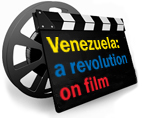“Venezuela Bolivariana” screened in London
- 11 July 2008
On July 10th, 2008, more than fifty people attended a London screening of the 2004 documentary, Venezuela Bolivariana. The event was held in Bolívar Hall and was the third part of the film season, Venezuela: a revolution on film, organised by Hands Off Venezuela in association with the Venezuelan Embassy.
This film has become a classic for Venezuela solidarity activities due to its great educational value and its focus on the voice of rank-and-file activists and grassroots supporters of the Revolution. It covers the period from the Caracazo uprising in 1989 to the first months after the failed coup of April 2002. Film makers Marcelo Andrade and the Calle y Media Collective explain the early development of the Venezuelan Revolution out of the appalling social and political conditions of the pre-Chávez Fourth Republic, as well as the first social measures and the victorious popular resistance against the attempted right-wing coup and imperialist interference. The scenes of the masses' fight to overturn the coup, in the face of violent capitalist repression, and Chávez's first speech after the putsch's defeat are really moving and inspirational.
{youtube}CZiqDVxPZuw{/youtube}Venezuela Bolivariana completely debunks several myths about Hugo Chávez and the Bolivarian Revolution without resorting to propaganda. It shows the reason why the 1992 military uprising led by Chávez enjoyed a mass support as eventually displayed by the victory of the MVR in the 1998 elections. It demolishes with factual video documents the right-wing TV propaganda about the alleged massacre of Puente Llaguno that was used as a justification for the 2002 TV-supported coup. It exposes the real nature of the "democratic opposition", not using the words of the government supporters but through their own words: in a series of revealing interviews during anti-Chávez rallies and in right-wing neighbourhoods, the opinions of the rich, white and bigoted oppositionists come to the surface as the most overt expression of class prejudice and antidemocratic arrogance. For example, one of them says that the rich must get richer so that the poorer will benefit from their "investments", therefore their wealth must be protected from the likes of President Chávez; another one openly declares that the Bolivarian government must be removed at any cost and afterwards only "the educated, the upper classes" must govern again...
After the screening, Jorge Martin (Hands Off Venezuela) explained that several events happened after the ones shown in the film. As many attendees noticed, in the film nobody talking openly about socialism. At that time, "Bolivarism" was considered the only acceptable definition of the process, but in January 2005 President Chávez opened a mass debate on the future of the Revolution declaring that the country was heading towards a socialist transformation.
In the film, the ex-guerrilla turned oppositionist Teodoro Petkoff explained that Chávez never nationalised anything but only delivered abstract speeches that scared the middle class. This was true at that time but it is not true any more, since some nationalisations, factory occupations and land seizures have occurred in the following years. Jorge Martin explained the limited character of these measures and the need to go beyond the capitalist system.
The third point raised by comrade Martin was that you cannot have half a revolution and the slowness of the pace of social change is creating some tiredness among the masses, as shown by the defeat of the constitutional referendum in December 2007. At the same time, economic power is still largely in the hands of the capitalist elite, which implies a very serious threat of sabotage to the Revolution. Since the 2002 coup the Venezuelan people have defeated both the overt and the covert manouvers of the oligarchy and the imperialists, but now the situation is at a crucial point. The question is whether the masses will find the necessary leadership that could bring about the "Revolution within the Revolution" against the internal bureaucracy in red shirts, evoked in the last part of the film.
Andy Higginbottom of Colombia Solidarity Campaign was the next speaker. He dealt with the recent developments of the situation in Colombia after the show-liberation of Íngrid Betancourt, kidnapped by the FARC in 2002. Andy explained how the mass media select the news in such a way that the most relevant information is not revealed to the general public, and this is especially the case about Colombia. Hundreds of thousands of displaced peasants, assassinated trade unionists and victimised left-wing activists are not part of the story forged by the propaganda machine about Colombia. While the Colombia Solidarity Campaign does not agree with the kidnappings, it is a scandal that we should only be supposed to pity Mrs Betancourt while ignoring the crimes of the Uribe regime.
Amancay Colque also spoke from the platform. She is a leading member of the Bolivia Solidarity Campaign and a Bolivian herself. She described how the mood among the masses dramatically changed in the last decade in Bolivia, as a part of a continental process where the workers, the peasants and the urban poor of the whole of Latin America have raised their heads against US-backed Neo-Liberal policies. Now, the government of Evo Morales is in danger because of a vicious right-wing manoeuvre that uses the banner of "local autonomy" to promote the overthrowing of the elected government of the MAS. Next August 10th there will be a recall referendum to revoke the positions of Evo Morales and of the regional prefects, and this will become a rallying point both for the revolution and the counter-revolution!
Many contributions came from the floor about all subjects touched both by the film and the speakers, allowing a very good debate to develop. A meeting about Latin America always raises several key issues that are relevant for every worker and militant in Europe, like immigration, the role of the working class today, mixed economy vs. socialism, and much more besides. We need more meetings like this!


 Please help build the campaign by
Please help build the campaign by